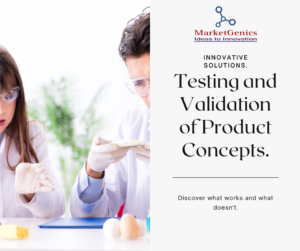A product’s ability to resonate with the target audience is just as important to its success in today’s fast-paced and competitive business environment as its features and functionalities. A product must satisfy consumer wants and expectations while reducing the risks involved in launching it onto the market, and this can only be achieved through idea validation and product testing. These procedures have historically relied on set techniques, but as technology has advanced and customer preferences have changed, creative solutions have surfaced to improve the efficacy of concept validation and product testing.
Let’s take a quick look at the traditional techniques for concept validation and product testing before moving on to more creative ways. In the past, companies have gathered input and ideas from prospective clients through focus groups, questionnaires, and prototype testing. Although these techniques have advantages, they frequently have drawbacks such small sample sizes, skewed responses, and the incapacity to faithfully replicate real-world situations.

Utilizing technology, innovative approaches to concept validation and product testing circumvent the limitations of conventional techniques and offer deeper insights into the behavior and preferences of consumers. Here are some innovative methods that companies can use:
Businesses can use virtual reality (VR) technology to build immersive environments where customers can engage virtually with product prototypes. This makes it possible to create testing situations that are more realistic and offers insightful input on things like usability, ergonomics, and user experience. Businesses can make better decisions by observing participants’ responses and preferences in real-time by submerging them in a virtual environment.
Large-scale data can be analyzed by AI-powered algorithms to find patterns, trends, and customer attitudes about a product or idea. Businesses can obtain important insights into customer perceptions, preferences, and problem areas by analyzing social media platforms, forums, and online reviews. AI also allows businesses to make educated judgments early in the development process by forecasting a product’s performance based on past data and market patterns.
Through the use of crowdsourcing platforms, companies can interact with a wide range of people—including clients, staff members, and industry experts—to get suggestions, comments, and ideas for bettering their products. Through the utilization of crowdsourcing, businesses may detect inventive resolutions, authenticate ideas, and guarantee that their merchandise strikes a chord with the intended market. Co-creation workshops are a useful tool for validating and refining concepts since they bring stakeholders together in real-time to brainstorm and prototype new products.
In order to keep ahead of the competition in today’s ever-changing business environment, companies must use creative techniques to concept validation and product testing. Through technological adoption, AI and machine learning, crowdsourcing, and co-creation strategies, businesses may better understand consumer preferences, evaluate concepts, and launch profitable products more quickly.
Businesses must continue to be flexible and proactive in their approach to idea validation and product testing as technology and consumer expectations both change at a rapid pace. In the dynamic realm of product development and marketing, firms may foster creativity, improve consumer happiness, and secure long-term success by keeping up with current trends and embracing innovation.
MarketGenics.co is one of the best market research companies to come up with innovative approaches for Market research findings and analysis.

MarketGenics India is a MRSI certified company.
Send us your resume at
info@marketgenics.co
© 2025 MarketGenics India Pvt Ltd.; All rights reserved